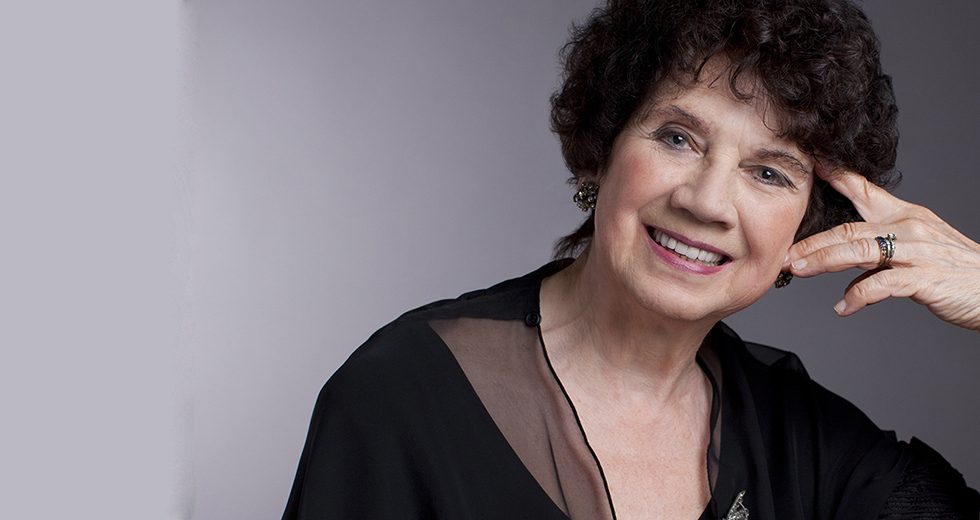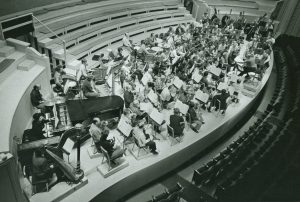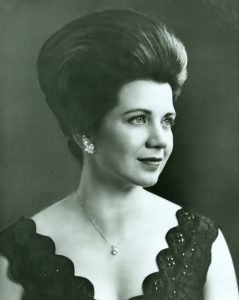
“Ben-Hur” with Charlton Heston premiered in 1959. That same year, Fidel Castro became prime minister of Cuba, Hawaii and Alaska became U.S. states, and Mary Sauer, a young pianist and Kenosha native, played her first concert with the Chicago Symphony Orchestra. On Nov. 8, 2016 — 57 years and many thousands of concerts later — Sauer retired from her role as CSO principal piano. She was the third woman to hold a CSO principal position.
For her, it’s been quite a ride. “The CSO was the first orchestra I had ever played with,” said Sauer, who on Feb. 18 will receive the CSO’s Theodore Thomas Medallion for Distinguished Service from Music Director Riccardo Muti. “Every piece was a new experience. I was very young, and to play with this wonderful orchestra was such an inspiration. I’d never heard anything like it.”
But as an audience member, she had heard the orchestra at least once before. “When I was going to Chicago Musical College, my boyfriend was an usher. He got me into a box seat when Rafael Kubelík [CSO music director, 1950-53] conducted The Moldau [from Smetana’s Má vlast]. There I was in my bobby socks and saddle shoes, sitting in a box with people dressed in formalwear. It was an experience to remember. I never thought that I’d one day be on that stage.”
Her first appearance on the Orchestra Hall stage did not involve the piano, at least not directly. In January 1951, Leonard Bernstein came to Chicago to conduct the CSO in Mahler’s Second Symphony, featuring a combined chorus from three area schools. Sauer, pianist for the choral rehearsals, asked if she could sing in the chorus for the performances. “They let me sing and that was my first appearance at Orchestra Hall.”
Before joining the CSO, Sauer regularly played for Chicago Symphony Chorus rehearsals. One day she received a phone call from CSO management, and she was hired to play celesta on Respighi’s orchestral showpiece, The Fountains of Rome.
If performing for the first time with a world-famous orchestra wasn’t pressure enough, the conductor of that concert was the very precise and demanding Fritz Reiner (CSO music director, 1953-62), legendary for his no-nonsense dealings with musicians. “The celeste was too high for most people to sit at, so they had built a podium for my chair to be placed on,” she said. “The podium was just big enough for the chair, and right before my first entrance, the chair slid off the podium, and my arms came crashing down on the keyboard. That was my first entrance! I was looking at Fritz Reiner, and he was looking at me. The violinists around me picked up the chair and set me down on it. I only missed a measure or two. Through it all, Fritz Reiner never took his eyes off me, and I never took my eyes off him. He never said a word about it, and I’ve been there ever since.”
In her second year with the orchestra, Sauer performed Stravinsky’s Petrushka with Pierre Monteux, who had conducted the work’s world premiere in 1911. “He [Monteux] was easy to work with and so generous,” she said. “He came back to the piano, took me by the hand and brought me up to the front of the stage to bow.”
Though Sauer began playing the piano when she was 7 years old, she didn’t start lessons for another two years. “I don’t ever remember learning to read notes. It was always just there.” She first studied with Irene Schneidmann, a Viennese teacher whom Sauer credits for her basic technique. After Schneidmann went back to Vienna, Sauer then studied with Rudolph Ganz, a legendary pianist/composer/pedagogue and a major musical figure both nationally and internationally. “He said that the grounding Schneidmann had given me was so evident in everything I did that he would not claim me as his student,” Sauer said. “This went on for an entire year. It was very humble of him, but I didn’t feel that way.”
Among her many solo appearances with the CSO, Sauer cherishes the memory of performing the Ganz Piano Concerto under conductor Jean Martinon (CSO music director, 1963-68).
“With Ganz, you learned technique by osmosis,” she said. “His concept of music was that of a conductor and a composer — always looking at the structure and the colors of the music.”
Sauer received both bachelor’s and master’s performance degrees from the Chicago Musical College. In addition to Ganz and Schneidmann, she cites another influence on her development as a pianist.

Sir Georg Solti and the Orchestra—with Sauer on piano and celesta—in rehearsal in the 1970s (Robert M. Lightfoot III photo)
The day Sauer auditioned for Ganz, she and her mother went to Lyon & Healy to look at instruments. There they encountered the renowned American pianist and RCA recording artist William Kapell who listened to Sauer play and proceeded to give her a 2½-hour lesson. In his many travels, Kapell frequently stopped in Chicago and often found time to meet with Sauer. “He worked in such detail, identifying each little motif, what instrument of the orchestra might play it and what function it has in the phrase,” she said. “He was a very exciting teacher.”
Sauer, too, has dedicated many years of her life to teaching. Since 1962, she’s been keyboard coach of the Civic Orchestra of Chicago, and for 33 years, was a member of the DePaul University piano faculty — 22 of those years as head of the keyboard program there.
In retirement, Sauer will continue as keyboard coach for the Civic Orchestra and will maintain her teaching studio in Chicago’s Fine Arts Building. She currently resides in Highland Park with her husband, Richard Hannenberg. Their daughter, Kristin, lives with her husband Robert Wassilak and their two children, Collin and Annika, in Forest Park.
Though Sauer has retired, she will remain a regular presence at Symphony Center. Along with her coaching work with the Civic, she hopes to attend concerts — as part of the audience. “I have the greatest admiration for my colleagues, their consummate musicianship and their passion and love for this profession.”
Jack Zimmerman, a recovering trombonist, is a Chicago-based writer and novelist.
